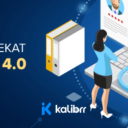The Ethical Considerations of Using AI in HR

Artificial intelligence (AI) has been transforming the way HR operates. From streamlining recruitment processes to predicting employee engagement, AI has been making HR tasks more efficient and effective. However, with great power comes great responsibility, and as AI continues to be integrated into HR practices, ethical considerations must be taken into account. In this article, we will explore the ethical considerations of using AI in HR.
TOPICS
Fairness and Bias
One of the main ethical concerns surrounding AI in HR is fairness and bias. AI systems are trained using historical data, which can perpetuate bias and discrimination. For example, if a company’s historical hiring data shows a preference for candidates from certain backgrounds, an AI system trained on that data may recommend similar candidates, perpetuating the bias.
To avoid bias, companies must ensure that the data used to train AI systems is diverse and representative. HR teams should also monitor AI systems to ensure that they are not perpetuating any biases. Furthermore, companies should have a system in place to address any biases that are identified.
Privacy and Data Protection
Another ethical concern is privacy and data protection. AI systems often require access to personal data, such as resumes, social media profiles, and performance reviews, to make informed decisions. While this data can help to improve HR processes, it also raises concerns about data privacy and protection.
To address these concerns, companies should ensure that they have robust data protection policies in place. HR teams must also ensure that they are collecting only the data necessary for the AI system to function and that they are using the data only for the intended purposes. Additionally, HR teams must ensure that they are compliant with data privacy laws, such as the General Data Protection Regulation (GDPR).
Transparency and Explainability
Transparency and explainability are also important ethical considerations when it comes to AI in HR. Employees and candidates should be able to understand how AI is being used in HR and how decisions are being made. For example, if an AI system recommends a particular candidate, HR teams should be able to explain how the decision was made and what factors were considered.
To address these concerns, companies must ensure that their AI systems are transparent and explainable. HR teams should also communicate with employees and candidates about how AI is being used in HR and provide them with clear information about the data being collected and how it is being used.
Human Oversight
While AI can help to improve HR processes, it is important to remember that it is not a replacement for human oversight. HR teams must ensure that they are not relying solely on AI systems to make decisions and that there is always a human element involved in the decision-making process.
To ensure that there is human oversight, companies should have processes in place for reviewing the recommendations made by AI systems. HR teams should also have the ability to override AI recommendations if necessary.
In conclusion, AI has the potential to transform HR processes, but it also raises important ethical considerations. HR teams must ensure that they are addressing issues of fairness and bias, privacy and data protection, transparency and explainability, and human oversight when using AI in HR. By doing so, companies can ensure that they are using AI ethically and responsibly to improve HR practices.
Kalibrr employs AI to better process and understand HR recruitment so that businesses can recruit the best candidates fairly and equally. Hire now with Kalibrr!
–
Kalibrr is a recruitment technology company that aims to transform how candidates find jobs and how companies hire talent. Placing the candidate experience at the center of everything it does, we continue to attract the best talent from all over, with more than 5.5 million professionals and counting. Kalibrr ultimately connects these talents to companies in search of their next generation of leaders.
The only end-to-end recruitment solutions provider in Southeast Asia, Kalibrr is headquartered in Makati, Philippines, with offices in San Francisco, California, and Jakarta, Indonesia. Established in 2012, it has served over 18,000 clients and is backed by some of the world’s most powerful start-up incubators and venture capitalists. These include Y Combinator, Omidyar Network, Patamar Capital, Wavemaker Partners, and Kickstart Ventures.






No comment available yet!